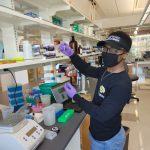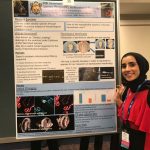Principal Investigator
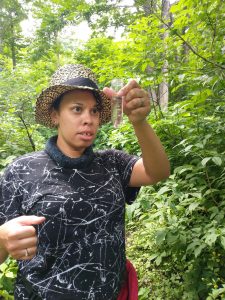
Mercedes Burns (B.A. Biology, Macalester College; Ph. D. Evolutionary Biology, UMCP) began her faculty appointment at UMBC in 2017.
Ph.D. Students

Ryan Bacon (B.S. Biology, West Chester University, PA) is studying the geography of sexual conflict. He recently conducted a meta-analysis of publications on reproduction in temperate and tropical species to identify correlations between seasonality and sexual conflict intensity.

Harper Montgomery (B.S. Biological Sciences/Biochemistry, UMBC) will explore the role of sexual conflict in reproductive and morphological diversification.
Masters’ Students
 Lian Jackson (B.A. UMBC) is interested in dietary effects on glycosylation in orb-weaving spider aggregate silk.
Lian Jackson (B.A. UMBC) is interested in dietary effects on glycosylation in orb-weaving spider aggregate silk.
Undergraduate Researchers
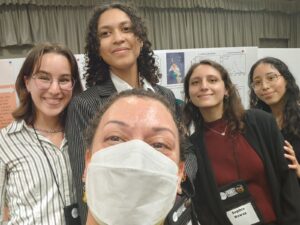
Nadja Bloetner (UMBC ’25)

Megan Ramirez Cuenca (UMBC ’26)
Sophia Nawaz (UMBC ’26)
Sarah Ruotolo (UMBC ’25)
Collaborators
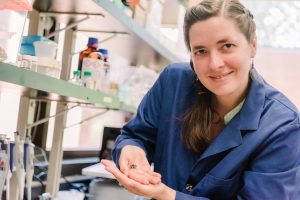
Dr. Sarah Stellwagen (M.S. Clemson, Ph.D. Virginia Tech) is currently a research assistant professor at the University of North Carolina at Charlotte. She continues to collaborate with Mercedes on the evolution and function of prey capture adhesives.
Lab alumni
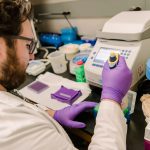 Tyler Brown (B.S. UMCP, Ph.D. ’24, UMBC) studied sexual conflict and reproductive assurance and their roles in the maintenance of geographic parthenogenesis. Tyler is passionate about science communication and can be found at @NotASpider_ on Twitter. He is currently a postdoctoral researcher with Dr. Stellwagen at UNC Charlotte.
Tyler Brown (B.S. UMCP, Ph.D. ’24, UMBC) studied sexual conflict and reproductive assurance and their roles in the maintenance of geographic parthenogenesis. Tyler is passionate about science communication and can be found at @NotASpider_ on Twitter. He is currently a postdoctoral researcher with Dr. Stellwagen at UNC Charlotte.
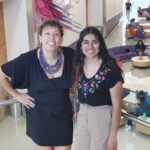 Jessica Diaz (B.S. Michigan State University, M.S. ICARE) studied biotic and abiotic correlates of oyster growth, including salinity and phytoplankton community diversity, in the Baltimore Harbor as part of the new UMBC ICARE program (icare.umbc.edu).
Jessica Diaz (B.S. Michigan State University, M.S. ICARE) studied biotic and abiotic correlates of oyster growth, including salinity and phytoplankton community diversity, in the Baltimore Harbor as part of the new UMBC ICARE program (icare.umbc.edu).
Emily Marinko (’23) is a current M.S. student at UNLV.
Dante Washington (’22) helped Ryan conduct a systematic review of research on reproduction of organisms in temperate and tropical biomes.
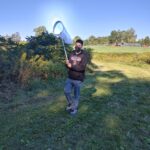
Hamed Hudhud (’21) is helping to prepare a proteomic protocol for measuring glycosylation in arachnid glues.
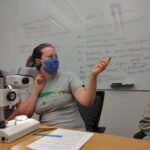 Heather Mayberry (’21) prepared an annotated bibliography of topics relating to the evolution of sex, and contributed to study of post-translational modifications in spider silks.
Heather Mayberry (’21) prepared an annotated bibliography of topics relating to the evolution of sex, and contributed to study of post-translational modifications in spider silks.
 Marina Fahim (’21) used flow cytometry to identify polyploid Japanese harvesters.
Marina Fahim (’21) used flow cytometry to identify polyploid Japanese harvesters.
Ryan Gunnison (’21, below) is fascinated by Hymenoptera and parasitism and is studied social behavior in harvesters.
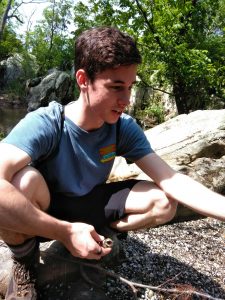
Fleurine Amouzou Guiffo (’20) studied early-developing harvester species Leiobunum flavum and L. ventricosum using morphological keys.
Zulekha Karachiwalla (’21) studied spermathecal morphology in Leiobunum using a variety of imaging and 3D modeling methods.
Shea Walsh (’20) studied the effects of humidity on harvester clustering and currently works for MD State Parks.
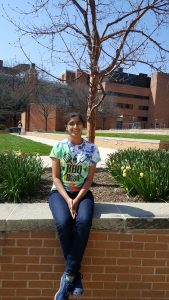
Mayukha Pakala (’19; M.S. Applied Molecular Biology ’20) used 3RAD sequencing to reconstruct the phylogeny of the L. vittatum group.
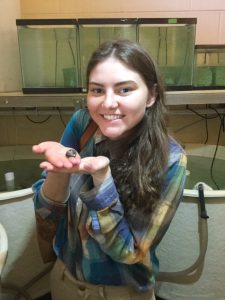
Genevieve Ahearn (’19) studied geographic patterns of body size and fecundity in facultative parthenogens.
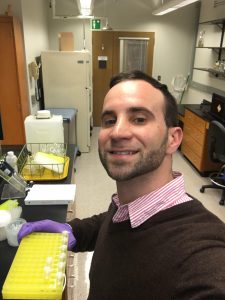
Frederick Flanagan (MS ’18, Applied Molecular Biology) is in dental school at the UMSOD, where he received a 2021 Dean’s Scholarship for Leadership and Excellence.
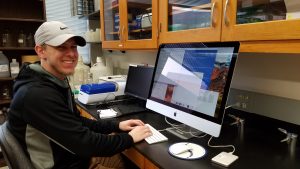
Daniel DeWaters (BS ’18) studied harvester ploidy, and wrote handy code for GBS2Ploidy and COLONY (https://github.com/dandewaters).
